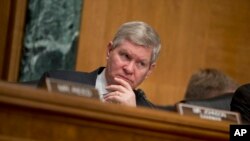CAPITOL HILL —
The chairman of the U.S. Senate committee that has crafted existing sanctions against Iran is speaking out against new penalties while international negotiations continue to limit Tehran’s nuclear program.
Sen. Tim Johnson, a Democrat of South Dakota and chairman of the Senate Banking Committee — the body that crafts financial restrictions on Iran — appears to be backing the Obama administration’s intensive lobbying effort to convince lawmakers to give diplomacy a chance.
“A new round of U.S. sanctions now could rupture the unity of the international coalition against Iran’s nuclear program,” Johnson said on Thursday, indicating that any Senate bill designed to boost sanctions against Tehran before the Dec. 31 deadline would face hurdles in the Banking Committee.
But the committee’s top Republican, Sen. Mike Crapo of Idaho, disagrees.
“Sanctions clearly worked to bring Iran to the negotiating table," he said. "I remain convinced that we must maintain that leverage moving forward.”
With the House of Representatives scheduled to adjourn this week, and the Senate next week, the opportunity for congressional action this year has all but passed, and any new sanctions measure that might be approved would face a near-certain veto by President Barack Obama.
“I understand that we are going through a ‘rope-a-dope’ [false maneuver] here in the Senate and that we are not actually going to do anything [on sanctions],” said Sen. Bob Corker, Republican of Tennessee.
A fellow Republican, Sen. Lindsey Graham of South Carolina, says Congress could revisit the issue early next year.
“At the end of the day, I think there will be a bipartisan bill produced, and I think there will be a vote in January," he said. "We will push [for it]. I am going to push.”
But according to State Department Under Secretary for Political Affairs Wendy Sherman, who told the committee that diplomacy must be given a chance to work, that would be a mistake.
“We must test that diplomacy, and the way to do that is to see through the compliance of this first step and to negotiate that comprehensive agreement," she said. "Congress always has the prerogative to act. It can act very quickly — I know that, particularly when it comes to sanctions on Iran.”
Sherman said the recently announced interim deal with Iran places strict limits on the country's nuclear activities and relies on robust verification, not trust.
Skeptics of the accord include Sen. Robert Menendez, Democrat of New Jersey, and head of the Senate Foreign Relations Committee, who says regardless of whether sanctions are imposed, Congress should clearly state what it expects from a final nuclear deal with Iran.
“Maybe what the Senate needs to do is define the endgame, and at least what it finds as acceptable as the final status.”
The Obama administration insists the only acceptable outcome is an Iran that verifiably does not produce nuclear weapons.
Some U.S. lawmakers doubt that goal will be achieved, especially absent further economic pressure on the country.
Sen. Tim Johnson, a Democrat of South Dakota and chairman of the Senate Banking Committee — the body that crafts financial restrictions on Iran — appears to be backing the Obama administration’s intensive lobbying effort to convince lawmakers to give diplomacy a chance.
“A new round of U.S. sanctions now could rupture the unity of the international coalition against Iran’s nuclear program,” Johnson said on Thursday, indicating that any Senate bill designed to boost sanctions against Tehran before the Dec. 31 deadline would face hurdles in the Banking Committee.
But the committee’s top Republican, Sen. Mike Crapo of Idaho, disagrees.
“Sanctions clearly worked to bring Iran to the negotiating table," he said. "I remain convinced that we must maintain that leverage moving forward.”
With the House of Representatives scheduled to adjourn this week, and the Senate next week, the opportunity for congressional action this year has all but passed, and any new sanctions measure that might be approved would face a near-certain veto by President Barack Obama.
“I understand that we are going through a ‘rope-a-dope’ [false maneuver] here in the Senate and that we are not actually going to do anything [on sanctions],” said Sen. Bob Corker, Republican of Tennessee.
A fellow Republican, Sen. Lindsey Graham of South Carolina, says Congress could revisit the issue early next year.
“At the end of the day, I think there will be a bipartisan bill produced, and I think there will be a vote in January," he said. "We will push [for it]. I am going to push.”
But according to State Department Under Secretary for Political Affairs Wendy Sherman, who told the committee that diplomacy must be given a chance to work, that would be a mistake.
“We must test that diplomacy, and the way to do that is to see through the compliance of this first step and to negotiate that comprehensive agreement," she said. "Congress always has the prerogative to act. It can act very quickly — I know that, particularly when it comes to sanctions on Iran.”
Sherman said the recently announced interim deal with Iran places strict limits on the country's nuclear activities and relies on robust verification, not trust.
Skeptics of the accord include Sen. Robert Menendez, Democrat of New Jersey, and head of the Senate Foreign Relations Committee, who says regardless of whether sanctions are imposed, Congress should clearly state what it expects from a final nuclear deal with Iran.
“Maybe what the Senate needs to do is define the endgame, and at least what it finds as acceptable as the final status.”
The Obama administration insists the only acceptable outcome is an Iran that verifiably does not produce nuclear weapons.
Some U.S. lawmakers doubt that goal will be achieved, especially absent further economic pressure on the country.












